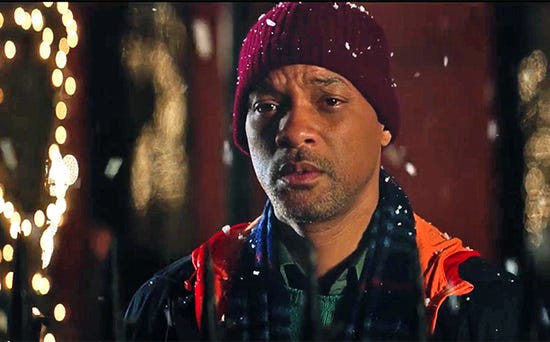Collateral Beauty

Shameless, soulless and deeply cynical in its treatment of grief for lost loved ones as a narrative shell game, “Collateral Beauty” is Will Smith’s latest Oscar-chasing provocation of existential platitudes and placating pabulum.
It easily outweighs Smith's previous low in this cottage genre of his (“Seven Pounds”) by several classes – so strenuously trying to hoist sentimental bullshit (in which it doesn’t really believe) to a place of meaning that you see it developing a real-time hernia. Apologists will tell you it’s only channeling “Miracle on 34th Street” or “It’s a Wonderful Life.” Run from those people. Run far. Don’t look back.
An original idea? Absolutely, but it’s fundamentally, irrefutably odious. At the heart of it, here’s a movie about people forcing their bereaved, suicidal friend into filmed, public breakdowns so they can then force him to sell their failing ad company and parachute on out of his life.
Happy holidays, everybody!
More to the point, these people — a trio of assholes played by Edward Norton, Kate Winslet and Michael Peña — hire a trio of actors (Helen Mirren, Keira Knightley and Jacob Latimore), to respectively portray Death, Love and Time. Their buddy and business partner Howard, a one-time “rebel command of brand” (exhibit A for Allan Loeb’s unconvincing Screenwriterese), is still unmoored by losing his daughter to cancer years ago and the relationships on which their advertising business is built are falling around him.
The irredeemable distastefulness is less that Howard’s fellow businessmen and women want to hold onto what they built. It’s that they could spend less – and not be garbage people – by paying to exploit legal loopholes. Instead, they ask these actors to goad Howard into a series of public outbursts they can film to prove he’s mentally unfit to hold onto his majority of voting shares and sell the company.
Not offensive enough? Norton’s character draws inspiration for this plan from his mother’s dementia: Project the reality in which Howard believes. (Unspoken but unsettling is the film’s bizarre, virulently anti-psychiatric slant in favor of enabling fantasies of, in his case, a sort of paralyzing psychosis.)
Why Death, Love and Time? They are, of course, easily hashtaggable by the marketing team with enough characters left over for some crappy promotional message like “How do you see the @CollateralBeauty around you? Share to win a free scarf!” But it’s also because a private investigator whom the asshole trio hired to follow Howard has intercepted angry letters he wrote to those three “abstractions” (as he, and Loeb, incorrectly refer to three very real concepts).
Howard writes these letters with a book about string theory perched on his desk, suggesting perhaps he’ll find some sort of time-altering tesseract through which to travel. That would be less ridiculous.
Because these hired actors are tracked to the, ahem, Hegel Theater, these people are clearly more than they seem. Wouldn’t you know it: They will teach the asshole trio paying them to essentially ruin someone’s existence something meaningful in the process! Will Death address Peña’s Cough of Doom? Will Time soothe Winslet that it’s not too late for her to have a baby? Will Love … have sex with Norton?
If only that were all. Howard attends a bereavement support group run by Madeleine (Naomie Harris). If you think Loeb – to whom you’ll want to deliver an arm-deadening stinger punch for writing this – is simply indulging in “perfunctory love interest,” well, get ready. Here, “Collateral Beauty” becomes an M. Night Shyamalan movie worse than the one Smith made with Shyamalan. Meanwhile, composer Theodore Shapiro’s pushy score is as welcome as someone breathing on you in a crowded elevator.
At every turn, “Collateral Beauty” feels like the medium rattling a table with his knees to soak the susceptible for their money. Grief as a parlor trick feels especially egregious with the vastly superior “Manchester by the Sea” – which treats bereavement as an identifiably human emotion, not without humor or perspective – playing just down the hall. (From a visual standpoint, director David Frankel lingers on Norton lumbering down a fancy staircase to show off the work of the production designer.)
“Casting … very important,” Mirren muses at one point. One would expect – with so many great talents – that someone, anyone, would pop. Nope. Mirren, Knightley and Latimore take their magical-realism nonsense far too seriously. Largely silent for half the film, Smith offers none of the charisma or gravitas he musters in even his most terrible movies (of which there have been so, so many in the last decade).
Norton running smug game on Knightley just makes his character seem more oily, not less. Two-thirds of Winslet’s scenes are – no joke – of her scanning sperm-donor websites or pamphlets. (That Hollywood thinks all a professionally thriving woman in her 40s really wants is a baby is, sadly, the most believable thing about “Collateral Beauty.”) And not even Peña seems to believe that his character – facing his illness for a third time – would spend more time with his fellow assholes than his wife or newborn son.
Oh, Smith also refers to Latimore’s character, an unthreatening young black man, as a “thug.” Pleasant.
Everyone here may have thought they were making a sort of contemporary riff on “A Christmas Carol.” Instead – in 2016’s absolute worst movie – they have mistakenly emphasized the dick in Dickens.


